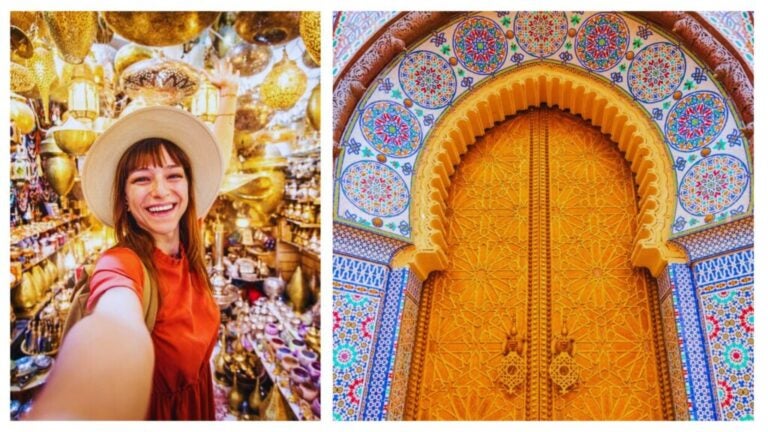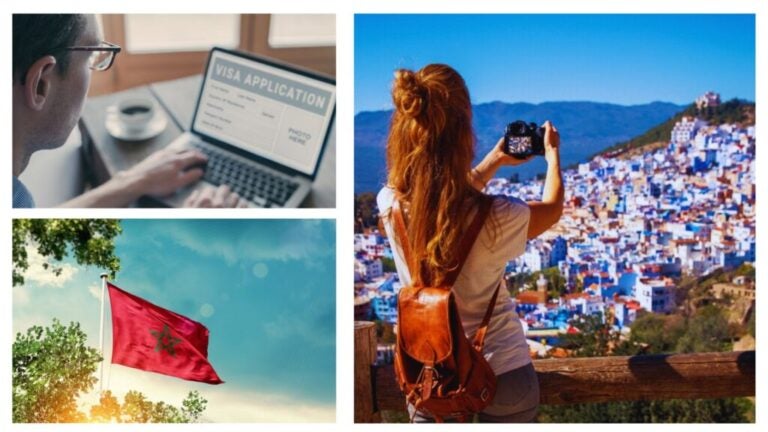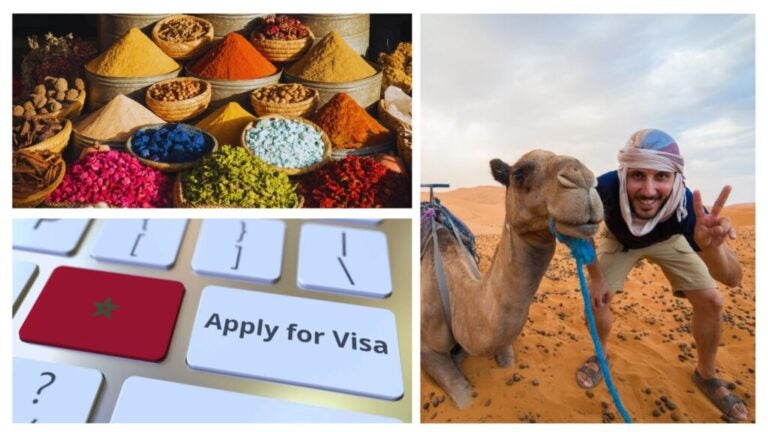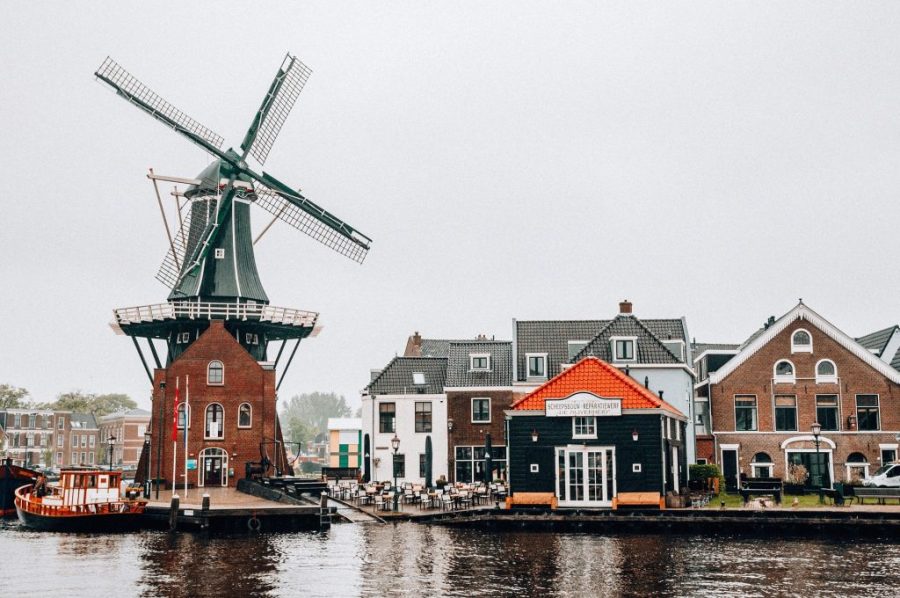Morocco digital nomad visa: How to get it?
Discover legal alternatives to the digital nomad visa in Morocco and learn how to manage your stay in this Arabian paradise.
Are you planning to travel to Morocco soon? This Arab country is a warm destination full of mosques, deserts, and spices that never go unnoticed by tourists and frequent travellers. Sounds like a great place to live and work remotely, right? But, does Morocco currently have a digital nomad visa?
Unfortunately, the answer is no. But don’t feel lost because it’s still possible to make this destination a reality. In this article, you’ll find the ways to get to Morocco and explore its most iconic places while sending a couple of emails from your laptop.
Is there a digital nomad visa in Morocco?
Travelling to Morocco and working with a view of the Sahara Desert is challenging, but not impossible. Although there is no specific visa for digital nomads, there are visa options that allow extended stays under certain criteria, and even visa exemptions for some foreigners.
Will there be a digital nomad visa launch in Morocco?
To date, there are no official announcements about the launch of a digital nomad visa in Morocco, but it wouldn’t be a surprise if the country joins this trend that neighbouring countries such as Spain and Portugal have already adopted, as cities like Marrakech attract millions of travellers each year.

Is it possible to enter Morocco without a visa?
Morocco allows entry without a visa for citizens from several countries for stays of up to 90 days; you only need to present a valid passport with a minimum of six months’ validity and, upon arrival, complete an entry form provided by the authorities. Here’s a list of some of the lucky foreign nationals:
- Argentina.
- Brazil.
- Chile.
- Mexico.
- Peru.
- European Union (all member states).
- USA.
- Canada.
- Australia.
- Japan.
- UK.
Alternatives to the digital nomad visa in Morocco
We now know that the digital nomad visa in Morocco is not a reality at the moment, but you’re not far from legally residing in the country as a remote worker. In this section, we’ll detail the most convenient options for digital nomads and explain how to apply for them.
Electronic Travel Authorisation (ETA)
This fully digital entry document is valid only for foreigners from Guinea, Congo, and Mali for tourism or business purposes. It is valid for 90 days from the issue date.
Requirements to apply for the ETA:
- Passport: With at least six months’ validity from the arrival date in Morocco and at least one blank page for stamping.
- Reason for travel: It’s intended only for tourism or business trips.
- Entry point: You must specify the entry point to Morocco when applying.
Application process:
- Access the online form: Complete the application form available on the official website or through authorised platforms.
- Personal information: Provide personal details such as full name, date of birth, nationality, and passport details.
- Trip details: Indicate the purpose of the trip, entry and exit dates, and the planned entry point.
- Payment of fees: Pay the applicable fee for the ETA application.
- Confirmation: Once processed and approved, the ETA is electronically linked to the applicant’s passport.

Self-employed work visa
Also called a self-employed work visa, this is an option for those wishing to live and offer their professional services independently in Morocco. This includes digital nomads who don’t have a fixed employer in the country.
| Duration | Allows a stay of one year, with the possibility of renewal for additional periods. |
| Requirements | -Valid passport with at least six months of validity.-Recent colour photographs.-Documentation proving professional activity (such as freelance registration in the home country).-Proof of sufficient financial resources for the stay.-Proof of accommodation in Morocco.-Valid health insurance during the stay. |
| Processing Fee | Usually range between $50–100 (€46–92). |
Step-by-step process to apply:
- Gather all required documentation.
- Submit the application at the Moroccan consulate or embassy in your country of residence.
- Pay the applicable fees.
- Wait for the resolution of your application; this process can take several weeks.
| Pros | Cons |
| -Initial stay of one year, with the possibility of renewal. | -Renewal requires meeting established requirements and may involve additional procedures. |
| -Possibility to work independently without needing a local employer. | -Documents proving professional activity need to be submitted. |
| -Affordable consular fees. | -Costs may vary, and additional expenses related to document legalisation and other administrative processes may arise. |
| -Application process can begin at the consulate or embassy in the country of residence. | -Process can be bureaucratic and time-consuming for gathering documents and waiting for approval. |
| -Allows carrying out various professional activities independently. | -Must comply with local regulations, and the professional activity must be permitted under this visa. |
| -Helps in opening bank accounts and contracting services in Morocco. | -Additional permits may be required for certain professional activities. |
Temporary Residence Card
If you plan to stay more than 90 days in Morocco, the temporary residence card is a valid alternative for one year, with the possibility of renewal for additional periods of up to 10 years.
The temporary residence card in Morocco is applied for while you are in the country. It cannot be applied for from abroad. The process must begin once you’ve entered Morocco, either with a tourist visa or any other valid visa for entry into the country.
To apply, you must go to the local authorities in the city where you are located, specifically at the Police Prefecture or the Foreigners Department. Here you will need to present the required documents and carry out the necessary administrative procedures.
Requirements:
- Valid passport and a copy of it.
- Recent colour photographs.
- Rental contract or proof of residence in Morocco.
- Proof of financial resources.
- International health insurance.
- Reason for application (explanatory letter or work contract if applicable).
Step-by-step process to apply:
1. Prepare the required documents.
2. Submit the application to the local authorities in Morocco.
3. Application fee: Approximately $100 (€92), which includes administrative and legalisation costs.
4. Wait for approval notification.
| Pros | Cons |
| Temporary residents are entitled to access the public health system, though with some limitations. | The temporary residence card has a one-year validity, with the option for renewal. |
| Working in Morocco is allowed, either self-employed or for others. | The process of obtaining it may be long and complicated, requiring multiple documents and meeting administrative requirements. |
| Living and working legally in Morocco, providing legal security for your stay and employment. | The residence card allows stay in Morocco but doesn’t permit travel to other countries without obtaining additional visas. |
| If you want to start a business, temporary residency facilitates the process of establishing a business in the country. | Temporary residency doesn’t grant the right to Moroccan citizenship. |

Sanctions for remote working without the right visa in Morocco
Morocco has strict regulations regarding remote work, and working remotely without the proper visa may lead to sanctions. While the country allows foreigners to work, not all visas grant permission to do so, especially if you’re working for a company outside of the country.
Visa Types that Allow Remote Work in Morocco
1. Temporary residence visa: If you plan to work for a Moroccan company or work remotely for a foreign company on a permanent basis.
2. Freelancer visa: If you’re self-employed or working as a freelancer, you’ll need to obtain a self-employed visa or a residence visa for independent professionals. This option allows you to work remotely for international clients.
If your stay in the African country is short, you can install the Holafly eSim for Morocco, which gives you unlimited data for the days you need, with no roaming charges and no need to change your SIM card.
Important: If you are a frequent traveler and want to stay connected without worrying about expensive roaming or looking for a new SIM at every destination, Holafly’s subscription plans are for you. With a single eSIM, enjoy internet in more than 170 countries for a fixed price and no surprises on your bill. Travel without limits and connect easily and securely! 🚀🌍

Which is the best visa for digital nomads in Morocco?
The freelancer visa is one of the best options for digital nomads in Morocco who want to settle for a relatively long period and work independently.
Reasons to choose the freelancer visa in Morocco
1. Allows you to work independently: This visa is designed for those who work for themselves, like digital nomads. If you work remotely for a foreign company or run your own business, this visa lets you do so legally in Morocco.
2. Initial duration of one year: It offers greater stability and peace of mind for those planning to stay in Morocco for an extended period. Additionally, this visa is renewable, allowing you to stay in the country for longer.
3. Access to labour benefits and services: You have access to various legal and financial services that make life easier, such as the ability to open a bank account, contract local services, and, if desired, start a business or engage in professional activities.
4. Clear and accessible requirements: While the freelancer visa requires some documents (valid passport, photos, proof of income, etc.), the requirements aren’t complex.
5. Work flexibility: It allows you to work with multiple clients and companies without the need for a fixed employment contract. This is ideal for digital nomads managing projects with various international clients and seeking the flexibility to work from anywhere.

Where can I get tailored advice?
Obtaining the right visa to work remotely in Morocco may present various difficulties, especially if you’re not familiar with the country’s legal and administrative system. The procedures can be complicated and require a correct interpretation of local laws, which may cause confusion and delays.
Finally, here are some government institutions and specialised companies that offer personalised advice for obtaining visas in Morocco:
1. Ministry of Foreign Affairs, African Cooperation, and Moroccan Nationals Abroad
This government entity is responsible for issuing visas and providing official information about the requirements and procedures to enter Morocco. Assistance is available in languages such as Arabic, French, and English. On their website “diplomatie.ma”, you can request all the information you need through a form, and they will respond as soon as possible.
2. Moroccan Embassy
It’s always useful to locate the Moroccan diplomatic representation in your country of residence before applying for a visa. Here, you’ll get firsthand information about consular services, visa requirements, and processes, as well as guidance on which visa type applies to your case.
3. Communities and Resources for Digital Nomads in Morocco
Joining local or online communities can provide valuable information and support from other digital nomads. Platforms like Outsite offer guides and resources for digital nomads in Morocco, including recommendations on accommodation, coworking spaces, and local activities.
4. Fragomen
Fragomen is a global firm specialising in immigration services for individuals, families, and companies worldwide, with offices in various cities. The firm offers a wide range of services, including:
- Consultation on immigration strategies for businesses.
- Management of visa and work permit processes.
- Immigration compliance and audit services.
- Support in obtaining citizenship and residency.

Are you ready for your next adventure? Get your visa for Morocco and don’t forget that you can install one of the Holafly monthly plans. From 25 GB to unlimited monthly data, you’ll be able to keep working, stay in touch with your colleagues and loved ones without worries. Activate it now!
Frequently asked questions about the digital nomad visa in Morocco
No, you don’t need a specific visa to work as a digital nomad in Morocco if you plan to stay for less than 90 days. However, if you wish to stay for more than 90 days, you’ll need to apply for a temporary residence visa or a freelancer visa.
Citizens from several countries, such as those from the European Union, the United States, Canada, Australia, and others, can enter Morocco without a visa for up to 90 days.
A valid passport, proof of professional activity (such as self-employment registration in your home country), proof of financial resources, accommodation in Morocco, and valid health insurance.
Yes, the temporary residence visa is valid for one year and can be renewed. After three renewals, you can apply for a residence permit that will be valid for 10 years.
If you don’t have the right visa, you could face penalties or issues with immigration authorities, such as expulsion or fines.
So far, Morocco doesn’t have a specific program for digital nomads. Cities like Marrakech, Agadir, and Essaouira are popular among nomads due to their infrastructure, climate, and culture. Stay tuned for potential updates on immigration policies.





 Language
Language 


















 No results found
No results found







